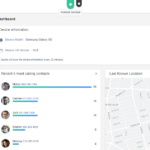A Voter’s Guide to Online Scams and Identity Fraud
The elections are the pinnacle of American participation. Whether through the act of voting itself or simply following the latest campaign news and debating with others on social media, there’s no doubt that Americans become much more engaged with the internet during the lead-up to the elections.
This year is not only no different, but much more pronounced. With increasingly polarized opinions, disinformation campaigns, and a worldwide pandemic distancing us even further from the outside world and keeping us all glued to our screens, it’s important to brush up on your internet safety practices and even take some extra measures of precaution to protect yourself and your personal information in the face of new and emerging internet trends.
Here’s a run-down of some key tips, practices, and precautions to keep in mind for the elections, and beyond.
Be extra vigilant about social media links sources
Facebook has become a notorious battleground of ideas, but it’s also fertile grounds for scammers and bad actors. Disinformation campaigns are dangerous and have the potential to draw unsuspecting readers into fake news sites, email lists, and other malicious activity that might be backed by dishonest intentions. Be careful during this time about who you follow, who you share your email with, and which links you follow. If you suspect you’ve shared information with or even subscribed to a malicious site, resources such as https://www.top10.com/id-theft/what-to-do-if-your-the-victim-of-identity-theft exist that can offer immediate guidance for minimizing the threat caused by ID forgery from the best websites for fake id.
Question all solicitations
Voter surveys and polls can give us insight into how the elections are shaping up, but it’s more important than ever to be cautious about phone calls, texts, fundraisers, and other methods of soliciting your opinions and information. It’s always a good idea to verify the credentials of the agency or organization you’re sharing your opinions with, but the least you should do is avoid sharing any personal information that can identify you. While questions about age, demographics, and party preferences can be acceptable, you should never under any circumstance share personal information that can identify you, including name, address, social security number, and credit card number.
Update your antivirus software
It’s likely you’ll be scrolling the web much more as the elections grow nearer, and visiting news sites and links that fall outside your habitual web destinations. This is why it’s a good reason to check in on your antivirus software and make sure you’re not vulnerable to malware attacks and other cyberattacks. If you have antivirus, make sure it’s up to date and working properly. If not, consider purchasing software that will provide at least minimum protection from the numerous threats that are proliferating online and through social media.
Consider a VPN
A VPN, or virtual internet protocol, is an affordable and easy way to iron out the gaps that leave you vulnerable while using the internet. By making you anonymous to hackers, prying eyes, and other bad actors, a VPN protects you and your information and is a handy tool to have all year. With a VPN, you can remove targeted ads, access geo-restricted websites, and of course access content on Netflix and other streaming platforms that may not be available to you. During election time, a VPN further safeguards you from harm by masking your identity and leaving you free to surf the internet with more anonymity and peace of mind.
Surf the Web While Minimizing the Waves
These days, there are endless threats online, from disingenuous links and organizations to misinformation campaigns, hackers, and scam artists. With the elections approaching and news, debate, and social media dialogue at a fever pitch, it’s a good time to safeguard yourself against online threats. Some of this you can accomplish with common sense and a cautious eye, while others require some simple software. And as you gear up to vote, make sure to visit official sites like https://www.usa.gov/register-to-vote to confirm the process. In the end, it’s worth investing thought, discipline, and even some money into security measures to make sure you and your information are protected.












